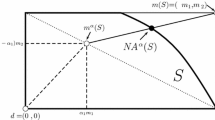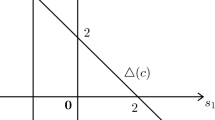Abstract
We investigate the implications of the principle of welfare-domination under preference-replacement or replacement in the context of bargaining. It requires that changes in the preferences of some agents, unaccompanied by changes in the resources, should affect all of the agents whose preferences have not changed in the same direction: all gain or all lose together. We begin with investigating the logical relations between replacement and two monotonicity axioms, weak monotonicity and population monotonicity. Then, we establish characterizations of the Kalai–Smorodinsky and egalitarian solutions on the basis of replacement. On the other hand, we obtain impossibility results if Pareto optimality and replacement are imposed together with either strong individual rationality or symmetry.



Similar content being viewed by others
Notes
For a survey of the literature on the axiomatic bargaining theory, see Thomson (forthcoming).
Introduced under the name of independence of irrelevant alternatives.
Vector inequalities: given x, y ∈ R N, x≦y, x≤y, x<y. Set inclusions: given two sets S and T, S⊂T, S⊆T.
It requires that the naming of agents should not affect the solution outcome.
We borrow this argument from the proof of Theorem 2.10 in Thomson (forthcoming)
References
Chun Y (2002) The converse consistency principle in bargaining. Games Econom Behav 40:25–43
Chun Y, Thomson W (1988) Monotonicity properties of bargaining solutions when applied to economics. Math Soc Sci 15:11–27
Kalai E (1977) Proportional solutions to bargaining situations: interpersonal utility comparisons. Econometrica 45:1623–1630
Kalai E, Smorodinsky M (1975) Other solutions to Nash's bargaining problem. Econometrica 43:513–518
Moulin H (1987) The pure compensation problem: egalitarianism versus laissez-fairism. Q J Econ 102:769–783
Nash JF (1950) The bargaining problem. Econometrica 18:155–162
Peters HJM, Tijs S (1985) Characterization of all individually monotonic bargaining solutions. Int J Game Theory 14:219–228
Roemer JE (1996) Theories of distributive justice. Harvard University Press, Cambridge, MA
Roth AE (1979) An impossibility result concerning n-person bargaining games. Int J Game Theory 8:129–132
Thomson W (1980) Two characterizations of the Raiffa solution. Econ Lett 6:225–231
Thomson W (1983a) The fair division of a fixed supply among a growing population. Math Oper Res 8:319–326
Thomson W (1983b) Problems of fair division and the egalitarian principle. J Econ Theory 31:211–226
Thomson W (1984) Monotonicity, stability, and egalitarianism. Math Soc Sci 8:15–28
Thomson W (1993) The replacement principle in public good economies with single-peaked preferences. Econ Lett 42:31–36
Thomson W (1997) The replacement principle in private good economies with single-peaked preferences. J Econ Theory 76:145–168
Thomson W (1998) The replacement principle in economies with individual goods. Soc Choice Welf 15:57–66
Thomson W (1999) Welfare-domination under preference-replacement: a survey and open questions. Soc Choice Welf 16:373–394
Thomson W (forthcoming) Bargaining theory: the axiomatic approach, Academic
Thomson W, Lensberg T (1989) Axiomatic theory of bargaining with a variable number of agents, Cambridge University Press
Vohra RV (1999) The replacement principle and tree structured preferences. Econ Lett 63:175–180
Author information
Authors and Affiliations
Corresponding author
Additional information
This work was supported by the Brain Korea 21 Project in 2003. I am grateful to William Thomson, Hyungjun Kim, a referee, and an associate editor for their valuable comments.
Rights and permissions
About this article
Cite this article
Chun, Y. The replacement principle in bargaining. Soc Choice Welfare 25, 141–154 (2005). https://doi.org/10.1007/s00355-005-0043-5
Received:
Accepted:
Published:
Issue Date:
DOI: https://doi.org/10.1007/s00355-005-0043-5




